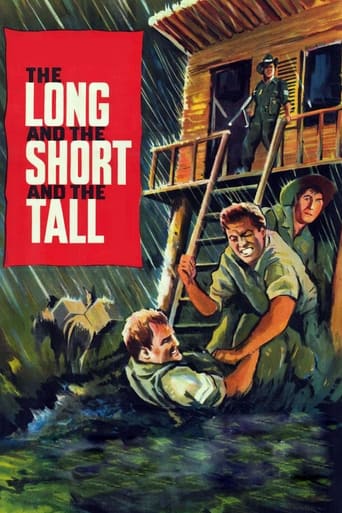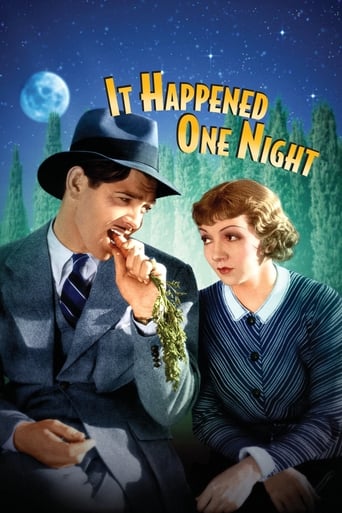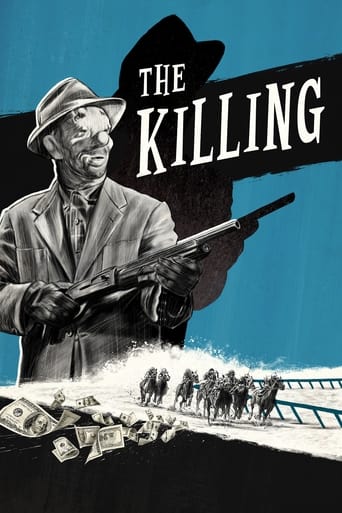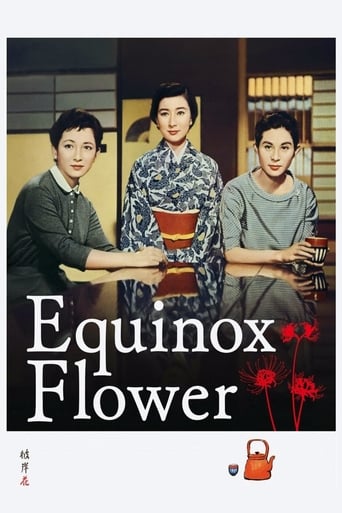


Equinox Flower
Wataru Hirayama's outwardly liberal views on marriage are severely tested when his daughter declares that she is in love with a musician and is adamant to live life her own way, instead of agreeing to an arranged marriage. Outwitted by his female relatives, Hirayama stubbornly refuses to admit defeat.
-
- Cast:
- Shin Saburi , Kinuyo Tanaka , Ineko Arima , Yoshiko Kuga , Keiji Sada , Teiji Takahashi , Miyuki Kuwano


Similar titles
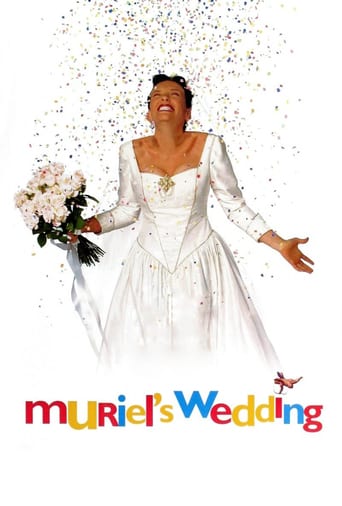
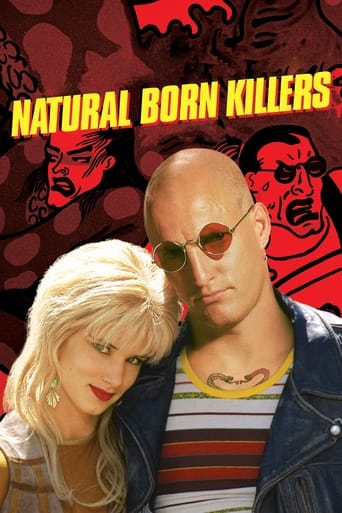
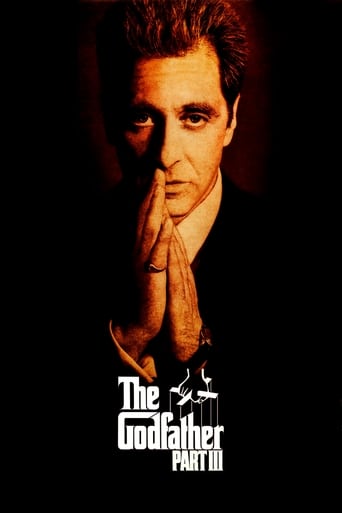

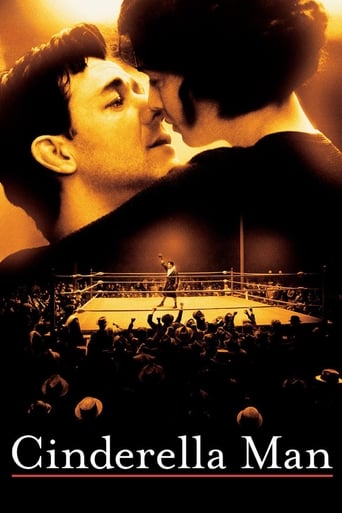
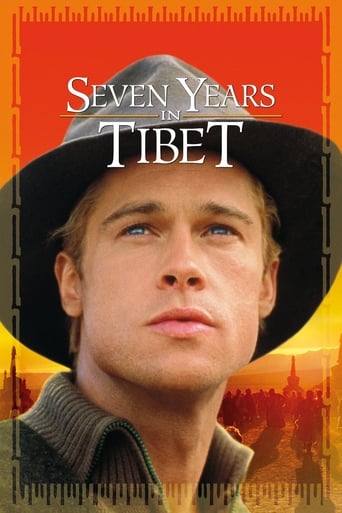
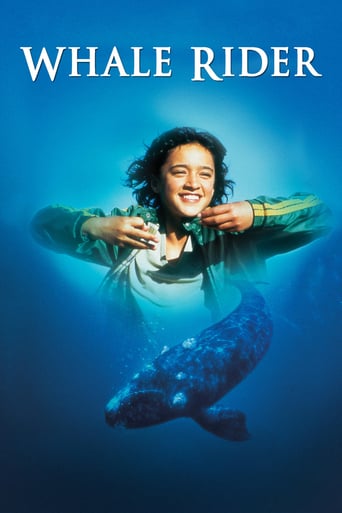
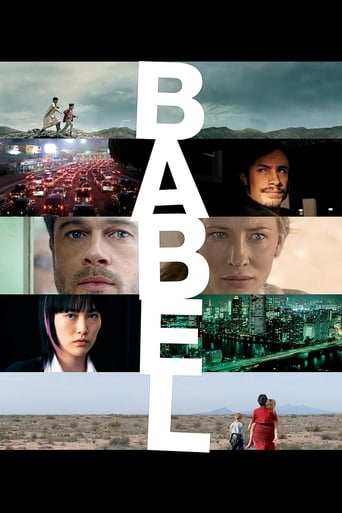
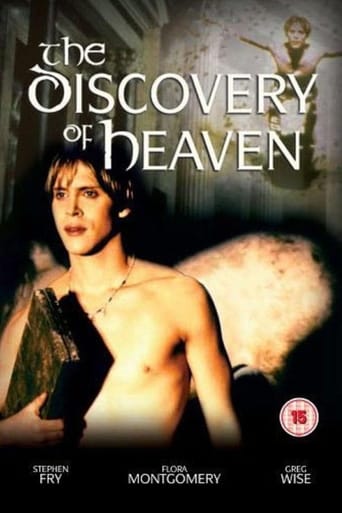

Reviews
Expected more
Captivating movie !
After playing with our expectations, this turns out to be a very different sort of film.
There is, somehow, an interesting story here, as well as some good acting. There are also some good scenes
The emptiness of the space in the very first images of "Equinox Flower" makes an impact on the viewer. An opening of this sort resembles those of Ozu's most famous films such as "Late Spring" and "Tokyo Story". However, soon we find out that "Equinox Flower" differs quite remarkably from these since it is essentially a comedy. In the first scene of the film Ozu instantly introduces the marriage motif -- a recurring subject in his oeuvre -- as two railroad workers are wondering the great amount of newly-weds. Only few artists have been able to establish a theme and set a tone, which are fully consistent with the rest of the work, so quickly yet still with such restraint and precision. Therefore, it is certain to the viewer from the start that what unfolds is the craft of a master. At its heart, "Equinox Flower" is a tender comedy because it fluently combines two aspects, which too often appear as contradictory, the ironic and the melancholic. Striking is also the fact that the film is Ozu's first comedy in approximately two decades. One must go back to the silent days to find a benchmark. This choice of return seems to coincide with Ozu's new sympathy (though I use the word hesitantly) for the younger generation, whereas he so often has sympathized the elders. It seems to me that in "Equinox Flower" the lightness and hopeful attitude towards life, noticeable in Ozu's earlier films, merges with the Chekhovian wisdom and elegiac tone of his later oeuvre. To an extent, "Equinox Flower" is a satirical treatise on the decline of parental and especially patriarchal authority in the Japanese family and society. However, Ozu is never hostile nor aggressive. He doesn't point out. He reveals. Although there are moments when Ozu lets us laugh at the protagonist's helplessness when trapped by his own outdated norms, Ozu never attacks on him. In addition to theme, Ozu's return to comedy also marked a turning point in his visual development because he used color for the first time, which later on became an inseparable element in his subsequent films. As a consequence, the world of colors in "Equinox Flower" is strikingly rich and precisely considered, leaving the viewer with several memorable and widely associative visual motifs. "Equinox Flower" is in many ways what one might call a simple film. There's not much of a story going on, let alone action of any kind, nor surprising twists in plot. Nonetheless, the viewer (any viewer whether an admirer of Ozu or not) is left with a powerful impact by the rich simplicity of the visuals; and the utter beauty of details. Above all, "Equinox Flower" is purely based on Ozu's unique poetry of the mundane; a vital principle in his cinema. Due to this simplicity, many western viewers have blamed, or at least explained their discontent, Ozu's films for a slow pace, but this criticism, however, doesn't really hit the mark because Ozu's films precisely create their own time in the poetic universe which differs from our world. In this rhythm or, in fact, Ozu's perception of time lies profound melancholy. The days go by, the clothes line dances in the wind, and emptiness prevails. In "Equinox Flower" the older generation remembers the war-time days, recalling especially its better times of carefree coexistence. In turn, such ideals as personal happiness and privacy threatened by the old, arranged, communal joy throb beneath the youth's dialogue. Ozu's characters are often aware of this melancholy -- human transience in the passage of time -- which brings sadness to their existence. A sensation that the old is about to vanish is always present, though so is the characters' ability to accept things as they are. As time is such an important theme for Ozu, his films can never be summed up with mere concepts such as "comedy" or "tragedy" since their (aesthetic) perspective is never restricted, but always reach to the most profound perspective of all, which is that of philosophy.
Equinox Flower was Ozu's first color film. He was reluctant to do it, but he shouldn't have been. He handles the addition so well. The colors really do join every scene together. Equinox Flower deals with one father's hypocritical view of love and marriage. It begins at a wedding where Hirayama makes a speech to his friend's daughter. He says how lucky they are to be able to choose their own partner. He does this in front of his wife in a very awkward moment. Hirayama and Kiyoko's relationship is interesting. They make their marriage work, even if there wasn't love there at first. They work together and never feel that they are trapped in this relationship. Despite his new world views during this wedding, once his daughter announces she wishes to marry a man, Hirayama is opposed. His hypocritical views are the cause of much comedy. He is also forced to face his prejudices as he finds a daughter of an old friend who has run away to be with her struggling musician boyfriend. Hirayama is supportive of everyone but his own daughter. Again though, with Ozu's eloquence, Hirayama is not a villain. It is understandable that he has different views concerning his own daughter. A group of men sit around and discuss the differences between sons and daughters. The growth of the whole family is well plotted and emotional. It's another wonderful and gentle deconstruction of Japanese family values.
Ozu is such a pleasure, a quiet one, meditative.The story here is about lives, whether they are arranged and what agency we have in arranging them. Many viewers will suppose that the topic was chosen because of some desire to make a comment about Japanese society.No, its because the filmmaker had turned introspective in his later years. His films are characterized by the way the shots are composed. Each one is a matter of absolute perfection. The perfection is so complete, you have to stop and study. You have to rerun certain scenes to see how amazingly the components arrange. He is the ultimate classical Japanese composer. Sometimes you see that the sets must have been especially built for one setup. Pure geometries and symmetries dominate. The camera is always static.The effect is that what you see has nature. Its natural, human. It flows in much the same languid, undramatic way that life does around us. But what we see is that flow in a highly composed context. Every element in that context naturally occurs but seems to have found its own harmony to please the eye of the viewer. Its the cinematic Japanese garden. There's a subtle thing here. Ordered nature presented so that the human composition seems so in tune with nature that we love it. But it is arranged. It is pure and unnatural too, sort of abstractly sublime.This viewer is a Westerner who works with Japanese concepts of ideal, natural harmony. Watching this makes me cry with a pleasure that avoids being joy.Ted's Evaluation -- 3 of 3: Worth watching.
Declaration of ignorance: this is the first film by Ozu I've seen (and while I'm not unwilling to see more, I doubt I'll go out of my way). I gather all his films have much the same style. Every shot is taken through the same lens, by a stationary camera which is always placed in the same position relative to the actors (knee-level, by the looks of it). The result is that we see simple, square image after simple, square image until we forget that there's any other kind.I disapprove of this on principle. Even if this technique works in a single film it's surely too limited to build an entire career out of. And how well can it work in even a single film, with the camera is so resolutely idle? It looks to me as if Ozu's dogmatism condemns him to a career of minor creations.And that's what `Higanbana' is, although I'm bound to say that it's a GOOD minor creation. The story is a kind of `Guess Who's Coming to Dinner', involving a decidedly liberal father who's shocked to the core when he finds HIS daughter wants to marry a stranger and is prepared to do so without his permission - although he comes around in the end, of course. That's about it. But despite the absence of story and the static images, the film doesn't move slowly, or not unpleasantly so. `Leisurely' is the word I'd use. It's a very easy film to like. You'll probably find yourself interested in the characters despite everything; failing that, if you're a Westerner, you'll get an agreeably strong dose of culture shock in an intelligible form.

